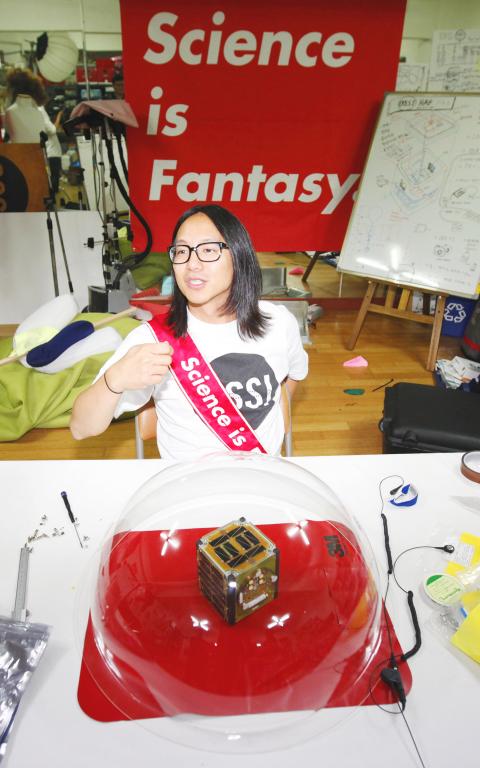Years of rummaging through back-alley electronics stores will pay off later this year for a South Korean artist when he fulfills his dream of launching a homemade, basement-built satellite into space.
“Making a satellite is no more difficult than making a cellphone,” said Song Ho-jun, 34, who said he built the US$500 OpenSat to show people they could achieve their dreams.
“I believe that not just a satellite, but anything can be made with the help of the Internet and social platforms. I chose a satellite to show that symbolically,” he said.

Photo: Reuters
There’s a long history of do-it-yourself satellites being launched by universities and scientific groups around the world, as well as amateur radio clubs, but Song said his is the first truly personal satellite designed and financed by an individual.
An engineering student at university, Song regularly incorporated technology into his art pieces. In a work called Apple he used light bulbs that would “ripen” — change color from green to red when people take photos of it with flashes.
After working as an intern at a private satellite company, he came up with the idea for his “Open Satellite Initiative,” which in turn led him to contact space professionals from Slovenia to Paris.
“I’m just an individual, not someone working for big universities, corporations or armies, so they open up to me and easily give out information,” Song said.
The bespectacled Song spent nearly six years combing through academic papers, shopping online at sites that specialize in components that can be used for space projects, and rummaging through electronic stores hidden in the back alleys of Seoul.
He ran a small electronics business to support himself, but the bulk of his funds came from his parents.
The cubical OpenSat weighs 1kg and measures 10cm3. It will transmit information about the working status of its battery, the temperature and rotation speed of the satellite’s solar panel.
Radio operators will be able to communicate with the satellite. If all goes well, it will repeat a message in Morse code using its LED lights at a set time and location. The components cost only 500,000 won (US$440). However, the cost for launching it hit 120 million won after Song signed a contract with NovaNano, a French technology firm, which acted as a broker to arrange the launch, including submitting paperwork and finding a rocket.
The satellite will be launched from the Baikonur Cosmodrome in Kazakhstan in December with another satellite.
Song has been invited to talk at international universities and organizations, including MIT Media Lab and CalArts, both in the US, and the Royal College of Art in London.
“The reason why technology or science is talked about is not because it is an absolute truth, but rather because it generates interesting stories,” he said.

The collapse of the Swiss Birch glacier serves as a chilling warning of the escalating dangers faced by communities worldwide living under the shadow of fragile ice, particularly in Asia, experts said. Footage of the collapse on Wednesday showed a huge cloud of ice and rubble hurtling down the mountainside into the hamlet of Blatten. Swiss Development Cooperation disaster risk reduction adviser Ali Neumann said that while the role of climate change in the case of Blatten “still needs to be investigated,” the wider impacts were clear on the cryosphere — the part of the world covered by frozen water. “Climate change and

Poland is set to hold a presidential runoff election today between two candidates offering starkly different visions for the country’s future. The winner would succeed Polish President Andrzej Duda, a conservative who is finishing his second and final term. The outcome would determine whether Poland embraces a nationalist populist trajectory or pivots more fully toward liberal, pro-European policies. An exit poll by Ipsos would be released when polls close today at 9pm local time, with a margin of error of plus or minus 2 percentage points. Final results are expected tomorrow. Whoever wins can be expected to either help or hinder the

Packed crowds in India celebrating their cricket team’s victory ended in a deadly stampede on Wednesday, with 11 mainly young fans crushed to death, the local state’s chief minister said. Joyous cricket fans had come out to celebrate and welcome home their heroes, Royal Challengers Bengaluru, after they beat Punjab Kings in a roller-coaster Indian Premier League (IPL) cricket final on Tuesday night. However, the euphoria of the vast crowds in the southern tech city of Bengaluru ended in disaster, with Indian Prime Minister Narendra calling it “absolutely heartrending.” Karnataka Chief Minister Siddaramaiah said most of the deceased are young, with 11 dead

DENIAL: Musk said that the ‘New York Times was lying their ass off,’ after it reported he used so much drugs that he developed bladder problems Elon Musk on Saturday denied a report that he used ketamine and other drugs extensively last year on the US presidential campaign trail. The New York Times on Friday reported that the billionaire adviser to US President Donald Trump used so much ketamine, a powerful anesthetic, that he developed bladder problems. The newspaper said the world’s richest person also took ecstasy and mushrooms, and traveled with a pill box last year, adding that it was not known whether Musk also took drugs while heading the so-called US Department of Government Efficiency (DOGE) after Trump took power in January. In a